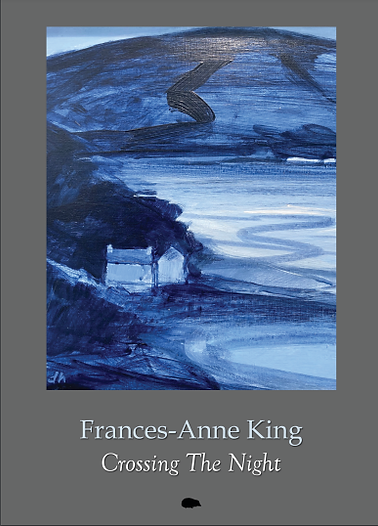
Awards
-
2021, First Prize, Hedgehog Press Poetry Competition
-
2018, First prize: St Hilda’s and the Poet’s House Oxford, Science and Poetry Competition
-
2017, Third prize and Commendation: The Interpreter’s House Poetry Competition
-
2017, Commendation: Norwich Poetry Writer’s Café Competition
-
2011, Commendation: The Hippocrates Prize
-
2010, Second Prize: Frogmore Papers Poetry competition
-
2010, Finalist: The Cinnamon Poetry Prize
-
2008, Highly commended: The New Writer Poetry Competition
Publications

Weight of Water
Poetry Salzburg Press
ISBN 978-3-901993-44-2
From Palette to Pen
The Holburne Museum


Crossing the Night
Hedgehog Press
ISBN 978-1-913499-91-4

Reviews
Weight Of Water
Agenda,
Spring/Summer 2014
“…There is a crystallizing of emotion and thought here which reminds one of Imagism in the precision of the lines, but with King’s own stamp of originality and exactitude: ‘ the murk of shadows…sifting images through my mind,’ ‘the tracing of branch-bones against a washed-out sky,’ ‘the bone-lit morning light’(conveying intimations of death),the heart behind the shadow of the lungs./the armour of ribcage’ (on the visit to a medical museum)…There is a sense of eternity one finds in Henry Vaughan’s poetry, of the binding of life and shadow.”
Acumen
January 2015
“…’Trace’ creates that vital space for the reader’s personal associations to invade the poem and its mysterious absences, “an empty seat full of presence”….’Fleet’ recalls one of the lost rivers of London and its contact to fluid histories. “downfall from a sacred river/to a stinking sewer…” beautifully framed in the banality of waiting for buses, very cleverly done. Two poems that face each other ‘Red’ and Lepidopterist’ share a kind of roving exoticism which is tapestry-like in the best way. ‘Red’ evokes “ the East at dawn” and ‘Lepidopterist’ exploits the weird and wonderful connotations of moth names: “ Great brocade, Billberry Tortrix.” This is a very fine pamphlet, with some resonant evocations of London places.”
Tears on the Fence
2014
“…Places and moments are haunted by traces of the past, by what is unsaid, ‘a cold ache of absence’, ‘that sound of chains in the wind – an empty seat full of presence’, ‘half-remembered voices’, things ‘hard to grasp’ as memory delivers images that can’t quite be trusted…
There are poems of suggestion and ellipsis, where nothing is solid: ‘a shape wavers into focus’, ‘the soundless movement of mouths’. But King’s triumph is that even in evoking mystery and the unsayable, her language is never less than exact…
I’ve never valued colour more than when reading King’s powerful poem ‘When Colour left the World’. And ‘Lost at Sea’, inspired by an art installation by mark Clarke, draws on all her skills of evoking loss and memory to convey the unbearable loss of a youth at sea.”
From Palette to Pen
Acumen,
September 2016
“Pleasure, indeed, was a central experience in holding, looking at and reading From Palette to Pen , edited by Frances-Anne King… ‘Nowadays, however, we certainly expect more than mere description (however vivid) from painting-poems and this collection certainly doesn’t disappoint…
The book is quite beautifully produced, in terms of layout, photographs, paper etc. Frances-Anne King deserves our gratitude for carrying this project through so successfully to so successful a conclusion.”
Martyn Crucefix Blog,
21 March 2017
"‘From Palette to Pen’ – a bit more ekphrasis."
![IMG-20200619-WA0000[100].jpg](https://static.wixstatic.com/media/b998a7_c2a3324f82264647aacb9e1a6c28b1ac~mv2.jpg/v1/fill/w_640,h_480,al_c,q_80,usm_0.66_1.00_0.01,enc_avif,quality_auto/b998a7_c2a3324f82264647aacb9e1a6c28b1ac~mv2.jpg)
